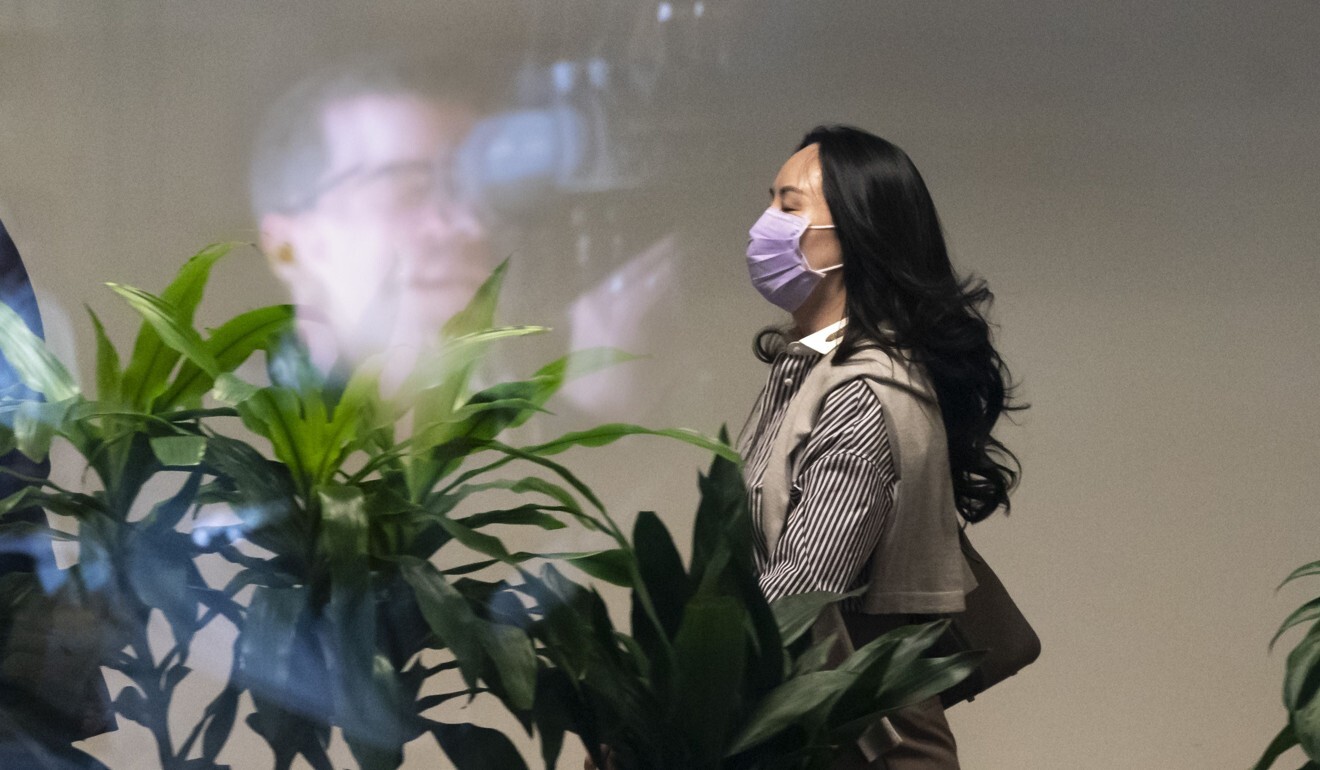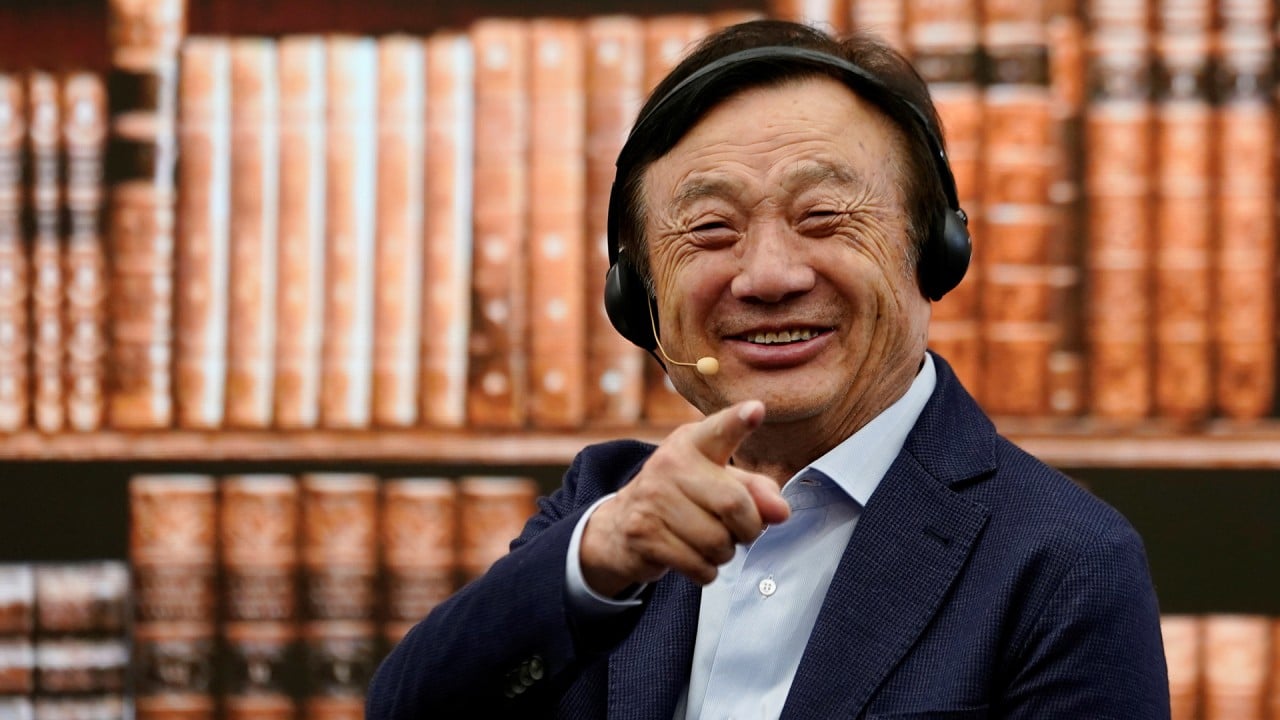
US misled Canadian court about its case against Meng Wanzhou so badly she must be freed, say her lawyers
- Huawei CFO Meng returned to the BC Supreme Court for her extradition case for the first time since May
- The hearing got off to a chaotic start with the judge forced to halt proceedings because of repeated audio interruptions on a media phone line
Huawei executive Meng Wanzhou returned to court in Vancouver on Monday, with her lawyers claiming that the American bid to have her extradited on fraud charges should be thrown out because US authorities misled the Canadian court about their case against her.
The hearing got off to a chaotic start as Madam Justice Heather Holmes halted proceedings because of repeated audio interruptions on a media phone line. The phone line was set up to listen in on the proceedings because Covid-19 precautions have limited the number of seats available in the public gallery.
The proceedings resumed after 10 minutes, but Meng’s lawyer Scott Fenton had to repeat his opening remarks.
Meng’s lawyers said in a submission that US authorities’ record of the case (ROC) had omitted key details about a PowerPoint presentation that Meng delivered to a HSBC banker in Hong Kong in 2013 about Huawei’s business dealings in Iran.

Fenton told the court there was “fundamental unreliability and inaccuracy” in the US record of the case. The US had failed in its “duty of candour”, he added.
The PowerPoint presentation forms the basis of US fraud charges against Meng, chief financial officer of Huawei Technologies and the daughter of founder Ren Zhengfei. US authorities claim she lied to HSBC about Huawei’s Iran dealings in a way that exposed the bank to the risk of breaching US sanctions against the country.
But her lawyers said Meng did not lie to the banker, referred to as “HSBC Witness B”; instead, US authorities had omitted the parts of her presentation that showed her describing the very business relationship with an affiliate called Skycom that the US claims she tried to cover up.
Canada’s duty lies in freeing Kovrig and Spavor from China
“The vast majority of what [Meng] stated to HSBC is not included in the summary … it is seriously misleading by omission,” Fenton said, citing two main points. First, he said, Meng told Witness B that Skycom was a business partner working with Huawei selling telecoms gear in Iran, and second, that Meng expressly told Witness B the relationship was “normal and controllable business cooperation”.
The written submission concluded: “The Requesting State has failed to meet its duty in the Applicant's case, and the Court must intervene to safeguard the Applicant's liberty … [The] misleading and incomplete record before this Court disqualifies [the US] from continuing these proceedings”.
The arguments about the alleged US omissions are scheduled to last until Friday.

Meng, 48, was back in court for the first time since May. She has denied the allegations against her.
She was arrested at Vancouver’s airport on December 1, 2018, on a stopover from Hong Kong. Her detention threw China’s relations with the US and Canada into disarray.
Soon afterwards, China arrested Canadians Michael Kovrig and Michael Spavor and has charged them with espionage, but their treatment is widely seen in the West as hostage-taking by China in retaliation for Meng’s arrest.
Meng remains under partial house arrest in Vancouver, living in one of the two multimillion-dollar homes she owns in the city. Her extradition proceedings are scheduled to last well into next year, but appeals could drag out the process for much longer.

08:55
Huawei's founder on US sanctions, 5G leadership and building trust in Europe
Fenton cited an affidavit by former White House adviser and Iran sanctions expert John Bellinger, who said the fact that Meng had put HSBC “on notice” that it was doing business in Iran was sufficient for the bank to have taken measures to prevent it breaching US sanctions on Iran. The precise nature of the relationship between Huawei and Skycom was not relevant, said Fenton, paraphrasing Bellinger.
A further serious omission from the US record of the case was that HSBC could have processed Huawei or Skycom's Iran-related transactions outside the US banking system in a way that would not have triggered any sanctions risk, said Fenton.
He cited former Standard Chartered banker Eric Wong, who described in an affidavit the Clearing House Automated Transfer System (CHATS), a funds-transfer system that allows settlement of international payments in US dollars without involving US institutions. The Hong Kong-based system settled US dollar payments worth an average of nearly US$855 billion per month in 2019, said Wong, and HSBC had used the system since 2000.
“Once HSBC knew Huawei operated in Iran, it had all the information it needed [to avoid sanctions risk],” said Fenton. “The ROC presents a wholly unreliable portrait … of the risk presented to HSBC.”
It’s business as usual for this Huawei group despite US sanctions
Whether HSBC chose to take steps to avoid the risk, by using CHATS or by vetoing transactions, was entirely up to HSBC and was not in Meng’s control, said Fenton. But HSBC chose to process the transactions through its US subsidiary. “That has nothing to do with what Ms Meng told HSBC,” he said.
In their written submission, Meng’s lawyers said: “[The] Requesting State was not diligent, candid or accurate in setting out the facts it asks this court to rely upon. The Requesting State has misled the court about the Applicant's representations to HSBC, the context in which they were made, and the resulting impact on HSBC.”
The submission continued: “As no other remedy can sufficiently address the prejudice to the Applicant and maintain the integrity of the proceedings before the court, the proceedings should be stayed.”

